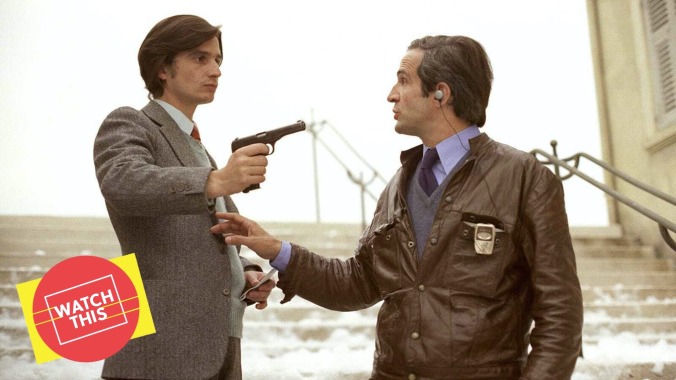A classic “movie about movies” offers escapism behind the scenes

Watch This offers movie recommendations inspired by new releases, premieres, current events, or occasionally just our own inscrutable whims. This week: With Wes Anderson’s The French Dispatch moving from July to October, we’re singling out other ensemble comedies to watch instead.
Day For Night (1973)
It’s been observed time and again that Meet Pamela, the fictional film-within-a-film whose occasionally rocky production is the backdrop of François Truffaut’s comedy Day For Night, doesn’t resemble a real movie. Certainly it has the plot of a bad drama, perhaps even one that might have been made in France in the early 1970s (though not by someone of Truffaut’s caliber). A young man brings his English fiancée home to meet his parents; she begins an affair with his father; the end is tragic. But as directed by Ferrand, the deaf movie-maker played by Truffaut himself, Meet Pamela comes across as illogical and stilted, its every scene filmed in long takes that are invariably ruined by some flub at the end: a slap that looks too phony, an actor who keeps trying to exit through the wrong door, a kitten that refuses to lap a plate of cream.
At times, Meet Pamela seems no more real than the impenetrably abstract adaptation of The Odyssey that figures in Godard’s bitter, disenchanted Contempt, which has often been referred to as the mirror opposite of Truffaut’s wry and gooey love letter to the fakery of cinema. One might even argue that Day For Night’s portrayal of collective life behind the scenes owes as much to the stage as to the screen, despite the unprecedented attention lavished on the minutiae of movie-making: the couplings; the backstage farce; the fact that Meet Pamela acts as something of a play-within-a-play, paralleling the personal lives of the cast. Alphonse (Jean-Pierre Léaud), who plays the young man, is jealous; Julie (Jacqueline Bisset), who plays his English fiancée, is carrying on a relationship with a much older man; Alexandre (Jean-Pierre Aumont), who plays the young man’s father, once had an affair with Séverine (Valentina Cortese), the actress cast as his wife.
It’s easy to grasp why Day For Night would come to be so beloved by directors (with the exception of Godard, whose splenetic reaction to the movie brought an end to his long, strained friendship with Truffaut): It presents the day-to-day existence of a film set as light Shakespeare, minus the speeches and turmoil. The struggle for one’s art plays no role in the episodic plot; in fact, the film doesn’t even have a main character. What it does have is a lot of romance and incident. While comedies about the film industry had been around since the early silent era, Day For Night was perhaps the first to make entire scenes out of the nuts and bolts of production. It shows soap bubbles being turned into fake snow; the workings of fake candles and fireplaces; a director picking out picture cars and props. The sequences shot with a handheld camera could even pass for documentary.
In this sense at least, almost every “movie about movies” that’s been made since owes a debt to Day For Night. But the realism is equaled by the film’s cartoonish quality; as in a comic strip, most of the characters wear the same clothes in every scene. Though it has long been an inspiration to budding filmmakers, it’s undeniable that Day For Night’s most conspicuous influence has been on the bittersweet, dioramic ensemble comedies of Wes Anderson, who even went to far as to pay elaborate tribute in his self-parodying commercial for American Express (a very funny short passed off as a credit card ad), riffing on a particularly memorable sequence with George Delerue’s triumphant theme playing in the background.
However, it’s worth noting that Day For Night has even less to say about reality than any of Anderson’s films, whose storybook worlds are very aware of things like class and money (in fact, more so than the majority of American movies). This is not a bug. Far from a peek behind the curtain, Day For Night is pure escapism. Even with its headaches, production woes, gossip, and diva behavior, the set of Meet Pamela—a film that few of us would ever actually want to see—is a reality more effervescent than our own.
Availability: Day For Night is available for digital rental or purchase through Microsoft, and on Blu-Ray and DVD from The Criterion Collection.